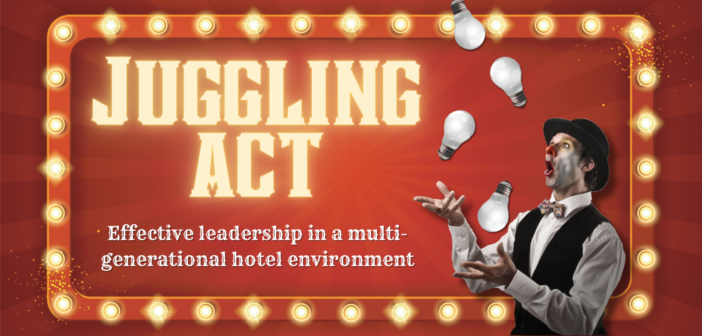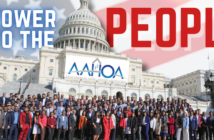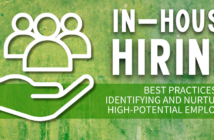Effective leadership in a multi-generational hotel environment
Being an effective leader in today’s evolving hotel industry goes beyond operational expertise. Hospitality leaders face the complex task of leading groups of people from diverse generations, each with unique viewpoints, beliefs, backgrounds, and communication preferences. Building an efficient, productive, and inclusive atmosphere requires supporting employees from all backgrounds and skill levels.
To succeed, hotels need to function like finetuned machines. Guest satisfaction depends on the seamless collaboration of hotel staff and service delivery excellence. It’s crucial for leaders to leverage diverse talents and skills appropriately and to carefully consider staff members’ ages. Staff will range from baby boomers with decades of industry experience to tech-savvy millennials and emerging Gen Z individuals. Each generation brings its own set of skills, strengths, background, and expectations to the job. Accordingly, effective leadership and communication strategies will help hotel leaders navigate multi-generational dynamics and arm them with practical solutions to foster collaboration, improve productivity, and enhance the customer experience.
WORKING AROUND THE SHORTAGE
Research from the University of Houston and the U.S. Bureau of Labor Statistics reported personnel shortages have affected the hospitality industry since the early months of the pandemic in 2020, leading to the loss of about 8 million jobs in the sector.
According to a January 2023 industry survey of more than 500 member hoteliers, 79% of U.S. hotels are facing a staff shortage, and 22% report the shortage is affecting hotel operations, mainly housekeeping.
Due to these workforce shortages, hotel leaders are desperate to fill positions, hiring workers from any demographic willing to take on the work to operate optimally and increase revenue.
With hiring at a premium, it’s as important as ever to retain as many team members as possible, and employee retention depends on many factors, one of which is effective leadership. In the hotel industry, as in most industries operating in the digital age, leadership must go beyond a one-size-fits-all approach. Being an effective hotel manager involves being more flexible and understanding the complex dynamics within multi-generational teams.
By embracing inclusivity, empathy, and adaptability, leaders can cultivate an environment where individuals of all ages feel valued, empowered, and inspired to contribute their best. Diversity can be an asset to building a more successful hotel business.
UNDERSTAND YOUR EMPLOYEES
According to the Bureau of Labor Statistics, workers aged 45 and older make up 26% of the hospitality industry workforce. Hotels and other hospitality businesses employ four or more generations of employees. Today’s multi-generational workforce includes baby boomers, Gen X, millennials, and Gen Z.
Getting to know your staff, especially their communication styles, is crucial. Each generation’s preferences influence how they work and interact with others. Using a more employee-centric leadership style is vital to attracting new talent and leveraging the unique strengths of each generation to achieve organizational goals.
“As leaders, we shouldn’t make assumptions about people because of what generation they fall under, the clothing they wear, or the color of their hair,” said Aaron Hall, an attorney specializing in business and employment law, as well as intellectual property and litigation. “Use open-ended questions to learn about people and discover their perspectives on discussed topics. Ask questions without bias to gain a better understanding of everyone. With a deeper understanding, hotel managers can communicate the topic they want to discuss more effectively. This strategy is essential for leaders as well as employees.”
It’s crucial to provide employees with the training and tools to understand how to do their jobs effectively. “Leaders must understand how well each generation or each employee performs in their job is based on a willingness to learn rather than the generation that defines them,” said Carol Davies, senior vice president of commercial strategy at Driftwood Hospitality Management.
“Every individual has a different work ethic, and it runs the gamut,” she said. “New systems are one important aspect that every generation needs to learn, so training is important. For the younger generation of employees, it’s important to know that sales is a relationship business and you have to build connections. Picking up the phone is key to building those relationships, which older staffers excel at, rather than sending a quick email or posting on social.”
 BABY BOOMERS AND GENERATION X
BABY BOOMERS AND GENERATION X
There are 41 million baby boomers in today’s workforce, and many want to work beyond 65. Hotel managers can use simple best practices to lead baby boomers effectively and foster collaboration among employees of all ages.
The AAIM Employer’s Association suggests managers allow senior staff members to share their expertise and knowledge with younger employees. Conversely, peer mentorship can help close the generational divide within teams by giving baby boomers access to tech training from younger employees. To accommodate different communication preferences, make sure senior employees can communicate clearly, establish policies outlining the platforms that should be used to deliver and receive information, and provide the necessary training.
Employing older workers, like baby boomers and Generation X, may benefit the hotel industry by lowering the turnover rate and enabling the industry to respond to the needs of senior customers.
 MILLENNIALS AND GENERATION Z
MILLENNIALS AND GENERATION Z
Two generations, millennials and Gen Z, recently surveyed by Deloitte Global, are gaining attention. According to Deloitte, these employees – born between 1983 and 2003 – account for nearly half (46%) of full-time U.S. workers. Forrester Research estimates Gen Z and millennials will make up 74% of the workforce by 2030.
Many millennials and Gen Zs value meaningful action and want firms to do the same, according to Deloitte’s annual millennial and Gen Z survey. Work/life balance and mental health need to be prioritized by organizations, according to millennials and Gen Z. They are encouraging leaders to reevaluate their hiring practices to improve inclusion, equity, and diversity practices. Companies will increase their resilience to change and foster business resilience if they actively listen to the demands and concerns of younger employees and take action.
DIFFERENT DYNAMICS
Gen Z is different from prior generations as they have experienced events like the COVID-19 epidemic and the Great Recession of 2007-2009, which have increased their awareness of safety and security issues. This generation has also witnessed the Me Too movement, as well as social justice issues, all of which have combined to make this demographic highly politically and socially aware on the whole.
This group is the most diverse generation in American history since it comprises about 50% of racial and ethnic minorities. As a result, Gen Z has played an integral role in helping push the workplace shift toward emphasizing more diversity, equity, and inclusion. In addition, Gen Z often seeks engaging jobs and tends to not prefer traditional chain-of-command leadership style, and has a reputation for letting managers know of their expectations. Typically, there’s more job turnover in this age group, so to retain these younger workers, managers must oversee this group more strategically.
“Communication and transparency are critical for leading a multi-generational workforce,” said Carolyn Richmond, chair of the hospitality practice group at Fox Rothschild LLC. “It’s important to find a common vocabulary. Managers must bend and adapt to employees of all ages, especially Generation Z.”
Key skill sets for effective leadership and approaches that work for employees of any generation include maintaining open communication, promoting candid and open dialogue among team members, and cultivating a climate of trust and constructive criticism. It is essential to keep communication flowing in both directions to motivate a 21st-century workforce. Richmond emphasized hotel leaders need to ensure they listen to their employees and show respect. She stressed that managers also need to explain why they make certain decisions. Richmond added employees are far more willing to buy into management directives when they understand the “why.”
“As hotel managers, we need to extend hospitality to our employees and make certain to follow through on respecting all employees, communicating well, and supporting all staff,” Richmond said.
EMPOWER TO INCREASE ENGAGEMENT
Both employee empowerment and engagement are critical solutions to address specific problems in hospitality organizations. Empowered employees can successfully manage unforeseen situations during service encounters. Engaged employees work with passion and pride, are devoted to their work, and show strong work involvement.
Intelligent, intuitive technology solutions keep employees proactive and engaged and better positioned to serve guests. Smart tech provides instant information to the right person at the right time.
“Employees need intuitive solutions and the right tools to efficiently work so they can be there for the guests and fulfill their needs,” said Markus Feller, chief executive officer of LIKE MAGIC, a SaaS hospitality management and communications provider. “Like guests, employees also need seamless experiences to service guests, and hospitality providers must evolve to survive. To succeed, it’s all about friendly and helpful human interaction on both sides – employees and guests.”
Feller mentioned employees of all ages will only adopt technology solutions if they’re easy to use and if they make staff-to-staff and staff-to-guest interactions easier. “Happy guests equal happy staff,” he said.
With every generation possessing unique communication styles, work preferences, and career expectations, employers need to be mindful that employees have lives beyond the workplace. Flexible work schedules, cross-generational training, and mentorship opportunities can bridge the generation gap and foster employee engagement. Hotel leaders must prioritize diversity, equity, and inclusion initiatives to remain competitive in the evolving hospitality landscape.
OLLYY/SHUTTERSTOCK.COM, YARAN/SHUTTERSTOCK.COM




